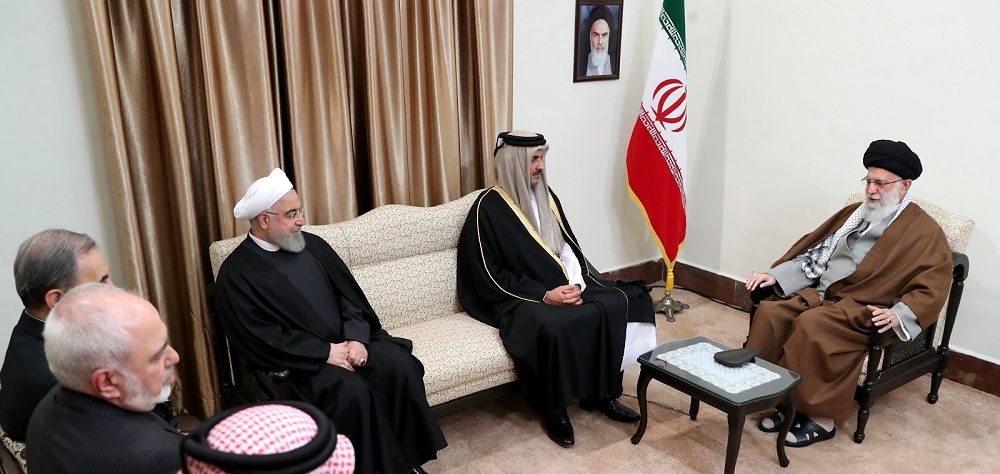Alwaght- On Sunday, Qatar’s Emir Sheikh Tamim bin Hamad in a surprise visit arrived in Tehran and held talks with senior Iranian officials. The trip to Tehran takes place while tensions between the US and Iran are unprecedentedly running high after Trump-ordered assassination of Iran’s General Qssem Soleimani, the commander of IRGC’s Quds Force, that triggered strong Iranian response marked by missile strikes on the American military bases in Iraq. The visit is significant as the Qatari emir travels to Tehran for the first time since the 33-year-old son replaced his father in 2013.
Unbalanced political and economic relations
The Iranian-Qatari relations over the past few years, mainly after the crisis with Saudi Arabia and the allied states that imposed a blockade on Doha in 2017, have been thriving with the focus being on increasing bilateral regional cooperation. The Sunday discussions highlighted the need for further political closeness and expansion of the business partnership.
Iran’s President Hassan Rouhani brought in the spotlight Iran's advances in different scientific and technological areas, mainly in water and power sectors, saying that the Islamic Republic was ready to transfer its experiences in these sectors and others to the “friend” country of Qatar.
Iran finds presence in the regional markets as an effective way to circumvent the US unilateral sanctions, especially in the energy sector. Qatar, as a wealthy state, can both invest in various sectors of the Iranian economy and be a market for its products. The country is a destination for agricultural and technological products and a major part of its needs are met by imports.
The sanctions imposed on Qatar by Saudi Arabia, the UAE, Egypt, and Bahrain has pushed Doha to seek alternatives to them as trade partners and turn head to such countries as Iran with which trade can be cheaper due to proximity. This is a strategic policy for Qatar. Emir of Qatar told the Iranian officials that the bilateral relations in economy, business, tourism, and investment needed progress more than ever at present. He said that Qatar welcomed the cooperation between the Iranian and Qatari businessmen and companies and provides special facilitation for them to expand.
According to an official statement, the bilateral commission is expected to hold a meeting within three months, a move that can help bring economic cooperation to the same level with the high-level political relations.
Security partnership and US presence challenge
Another part of discussions between Iran and Qatar was the regional developments as the tensions between Washington and Tehran keep escalating. Amid fears of a war with uncertain aspects between the US and Iran following the US regime's assassination of Iran’s top General Qassem Soleimani, a string of countries sought to contain the escalation of tensions. Qatar was first to send its foreign minister to Tehran stepping up diplomatic movement towards de-escalation. Iran repeatedly says that it does not view regional security as a non-collective and trans-regional case. Rather, it insists that any security order should ensure securing the collective interests of the regional nations and keeping the region away from the foreign powers’ meddling.
It was based on this view to regional security that two months ago Tehran unveiled its Hormuz Peace Initiative (HOPE) and called for the regional countries to entertain it and send feedback. Iran’s Leader Ayatollah Sayyed Ali Khamenei during the meeting with the Qatari emir underlined the “inappropriate regional conditions now” saying that the US and its allies’ “sewing of corruption and division” is the root cause of the regional troubles adding that the only way to counter them is to rely on intraregional cooperation.
Qatar is one of the regional countries welcoming Iran’s HOPE initiative. Sheikh Tamim told the Iranian president that Qatar believed cooperation with Iran was as an influential country to restore security and any work to secure the region without Iran was fruitless.
However, the important challenge that can hardly be overlooked is Qatar’s hosting of one of the bases of the US military in the region, labeled terrorist by Iran. Al-Udaid Airbase as the biggest American airbase in the region and the seat of the US Central Command’s (CENTCOM) command center had an essential role, as the evidence shows, in arranging the operation to assassinate Iran’s General Soleimani. Tehran wants explications and clarifications from the Qataris on the issue.
To the end of “tough revenge” as promised by Iran in reaction to assassination of its top military commander, Iran has focused its strategic policy on expelling the American forces from the region. It labeled the Pentagon and US forces as terrorists and thus legitimate targets to the Iranian armed forces in the region. As the CENTCOM takes steps to endanger the Iranian interests in the region, it exposes to risks the security of countries hosting the US bases. Certainly, Qatar needs to find a solution to this latent challenge. Although currently Qatar cannot shut Al-Udaid Airbase, Iran’s fury with the Qatar-hosted airbase’s role can give Doha a pressure tool to more closely watch the American military activities on its soil and make sure they do not work against interests of Qatar’s regional partners.



























